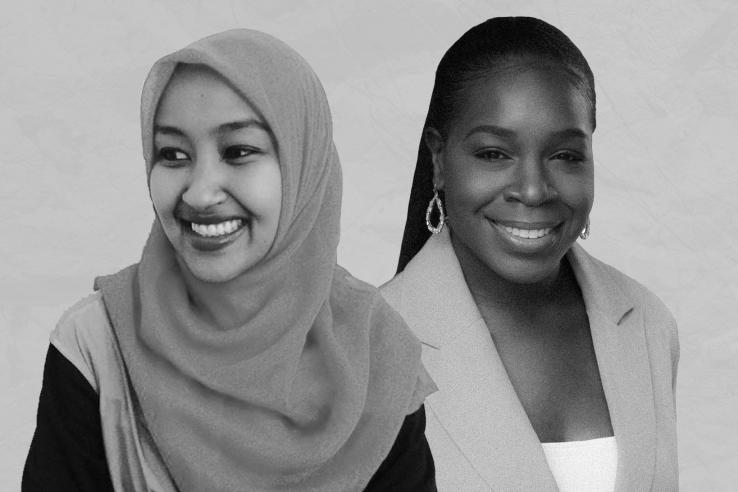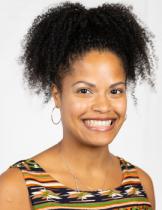A conversation with Research in Color on the importance of mentorship in the economics profession

J-PAL North America’s Economic Pathways work aims to expand access to the field of economics at every juncture in the professional pipeline, from high school to tenure.
In 2020, J-PAL North America staff spoke with Research in Color Foundation Founder and President, Chinemelu Okafor, and Vice President, Rahma Ahmed. During this conversation, the Research in Color leadership discussed their dedication to increasing the number of PhD students of color in economics and economics-adjacent disciplines in order to build a more diverse and inclusive profession.
The following interview is transcribed and edited for length and clarity.
What is Research in Color (RIC)? What motivated you to start this organization?
Chinemelu Okafor: The Research in Color (RIC) Foundation is a nonprofit organization based at Princeton University that strives to improve the levels of diversity and inclusion in economics by increasing the number of graduate students of color in the economics discipline, and by amplifying meaningful economic and policy research that benefit communities of color.
Through a mentorship-centered approach, we match students of color interested in pursuing a doctorate in an econ-based field with seasoned economist mentors.
I was inspired to start RIC by my own journey with mentorship within economics. I found navigating academia to be challenging until I met my first mentor, Dr. Tristan Reed, during my time at the World Bank Group almost three years removed from undergrad. I'm currently an emerging scholar at Princeton in the Politics department and wouldn't have known that a pre-doc, or a PhD in general, was an option for me if it weren't for Tristan.
Rahma Ahmed: Can I just add that Dr. Tristan Reed is also one of our mentors right now, so he has maintained that connection with RIC.
Okafor: I realized how unfair and inequitable the profession was, especially for people who look like me. In undergrad there wasn't a space for me, a Black woman, to discover if I was interested in economics and gradually grow in my passion. This is detrimental to the racial and ethnic composition of the economics profession, given that so many people of color lack access to the resources and knowledge to smooth their path to the profession while providing them with the skills that they need.
With my own trajectory in mind, I wanted to create Research In Color because I wanted others who are interested in the field to experience having an incredible mentor guide them. On top of that, I created RIC to amplify meaningful economic and policy research about communities of color by prospective PhDs of color, and to expand the perspectives, paradigms, and methodologies applied to the research that directly affects these communities. At the end of the day, good mentorship is important for people of color and this organization can help with that.
We know that you just finished your first cohort. Can you tell us a little bit more about the cohort? How did it go?
Okafor: We have an incredible set of mentors who volunteered their time to our mentees, and we've been so lucky for their diligence and patience. Our first mentor cohort is a set of phenomenal economists from institutions like Princeton, Stanford, Harvard, and the World Bank, among others. A lot of our mentees have gained clarity on their journey and are accessing awesome opportunities. Some mentees secured jobs at the World Bank. Some have developed incredible bonds with their mentors. Others have been approached for academic research assistant (RA) positions.
Ahmed: It was just so exciting to see people asking, “is so and so available? Do you think they are interested in this type of position?” That was just such a difference. You're being approached by somebody in this field that you want to join, rather than you chasing them down. It was surreal to have that happen.
Okafor: These are the opportunities that people have access to if they join Research In Color. We wanted to level the playing field because—we have to test this, obviously—but would these opportunities be available to us without Research in Color? Would people be coming forward asking to work with our mentees? We're not sure, but we do think that a lot of people have gained so much from this.
Ahmed: And I think it's helpful to mention that Chine and I met while we were doing research at the International Finance Corporation. That's how we gained a very real understanding of how much this discipline needs to change. When it's you and maybe just one other person that looks like you at work, you're unsure if your voice matters as much as everyone else's. Because clearly, if it did, there would be more people that look like you in this space. Our experience fed into how we structured RIC. It's excellent that people are getting opportunities with these types of institutions. It's about time.
In your opinion, why does diversity matter for the economics discipline?
Ahmed: Economics is a field that relies on a set of assumptions about human behavior, the individual, and society. So, for me, it only stands to reason that this field should reflect the diversity of humans and their experiences, behaviors, and circumstances in life.
I want to make this clear: the field of economics is not going to be doing underrepresented minorities a favor by including them in the conversation and increasing their involvement. It will be increasing its own utility as a field by strengthening the validity of its findings and conclusions.
Also, many economists are involved in policymaking. For this reason, it's all the more critical to have economists represent the diversity of perspectives, concerns, and experiences of the various communities that those policies affect. It's also important to challenge the implicit decisions we make about who is in the room and who we leave out of this conversation.
Could you tell us a little bit more about some of the challenges you faced doing this work?
Ahmed: I think one of the biggest challenges we face is explaining why it matters to have a diverse discipline. Then, it’s spreading the word about who we are, what we hope to achieve, and by what means.
In this new political climate—with the renewed momentum around the Black Lives Matter movement, for which we're incredibly grateful—there's been increased, belated attention to long-standing conversations about race that we should have had decades ago. We hope that RIC and the larger movement will continue to receive support, because this is not a passing trend.
Another challenge is that our team is relatively small, so we are limited in terms of our staff capacity and resources. But it has been important to set aside the fear of failure and focus on continuous improvement to better amplify our cause.
How can other organizations or economic professionals support Research In Color in doing this work?
Okafor: I'd like to think that if you truly care about our mission, you'd be interested in volunteering to be a Research In Color mentor to support students of color on their journey to a PhD. You can also donate to Research In Color so that we can build our mentorship capacity and further amplify our cause.
Last but not least, you can focus on partnering with historically Black colleges and universities (HBCUs) or schools that have a strong racial and ethnic minority makeup, because these are the institutions that have been successfully producing economics majors of color who subsequently complete PhDs. Those are simple and important steps that you can take to support RIC and make the profession more equitable.
Lastly, what advice do you have for others who are trying to do this work?
Ahmed: We challenge programs to work directly with the communities they’re hoping to engage with to inform their programming. It is critical to keep underrepresented groups front and center in the process instead of having a top-down approach that assumes that your organization knows what's best for them.
We could also really do a lot more to actively collaborate with HBCUs. They have long been doing this work extremely well and they have already built a foundation for most of the new programs. I do not believe you cannot have a serious conversation about increasing racial or ethnic representation without learning from and working with HBCUs. This is their mandate.
Related, it's important to involve faculty of color in your work at a personal and professional level. These are people who were once students in a system that had so many structural barriers to their success. Ask them for the critical pieces of advice that helped them get where they are or what they wished they had during their journey.
It's also important to engage with them professionally by offering them platforms to talk about their work and research as academics and public policy officials in their own right. Finally, it’s important to remember that small gains are powerful. If you help even just one person, I think you have done your job well.
Any final thoughts?
Ahmed: One last thing I want to add is that it is a good thing that there are people leading the charge to change how the profession addresses race and other social factors. But the fact that the responsibility is falling on underrepresented communities themselves is indicative of a larger problem we have of doubling the burden on people who are fighting the very systems that they are suffering under. It's important for people to recognize that this is an all hands on deck job and a long-term commitment. It's not a new or passing movement. We need to actively negotiate what we have accepted as normal.
Okafor: At the end of the day, we're trying to fix the structural impediments that exist along the pathway and pipeline of economics and adjacent fields. I often think back to something that I realized when I started at Princeton. Many students had advanced classes like linear algebra and real analysis under their belt prior to undergrad. I asked myself, how is that even possible? So many people of color, and Black people specifically, do not have access to these resources.

